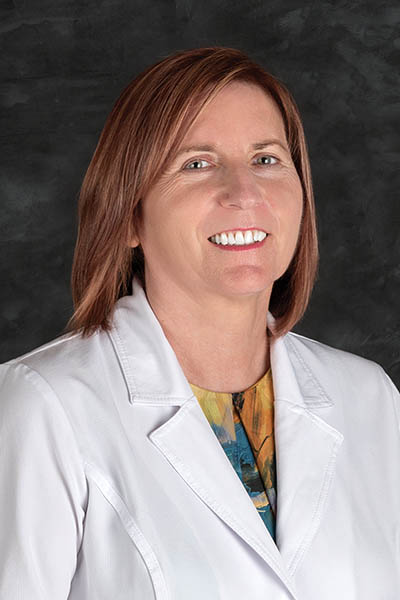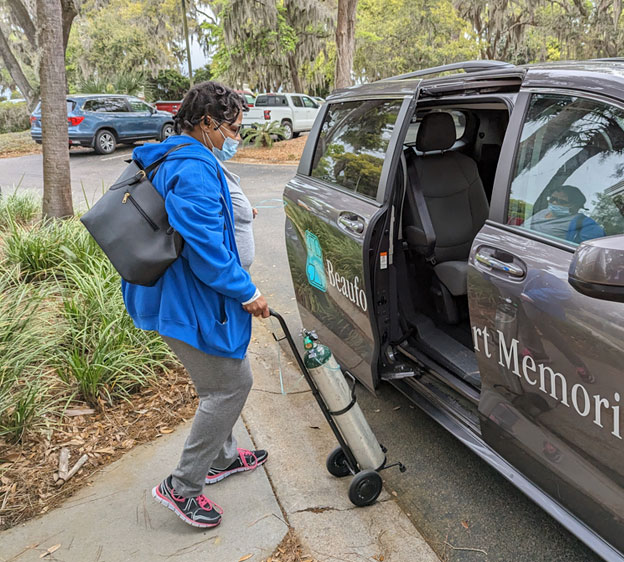
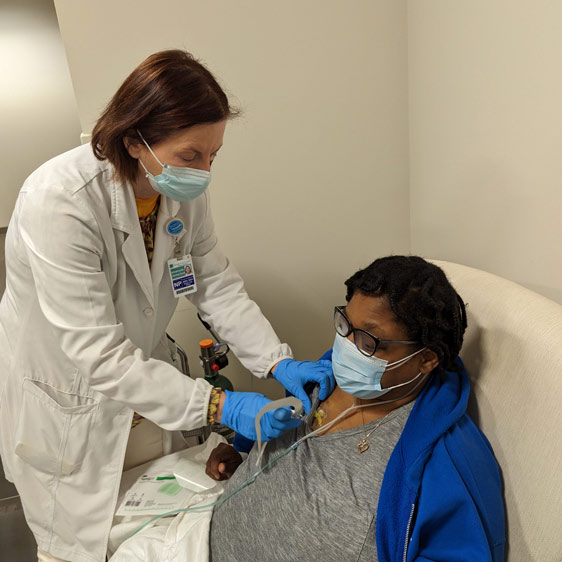 When you need to visit your medical provider, you likely hop in the car and drive over to the office. For some people, it’s not quite that simple. Transportation barriers keep many patients from seeking the care they need.
When you need to visit your medical provider, you likely hop in the car and drive over to the office. For some people, it’s not quite that simple. Transportation barriers keep many patients from seeking the care they need.
Beaufort Memorial is helping patients step beyond those barriers to access valuable health services. The hospital’s transportation service is designed to help patients, many who have sickle cell disease or require infusion services, get to and from their medical appointments.
The service, which began in 2021, is filling a vital need within the community, according to Annemarie Gault, NP-C, a certified nurse practitioner who oversees the Beaufort Memorial Sickle Cell Clinic.
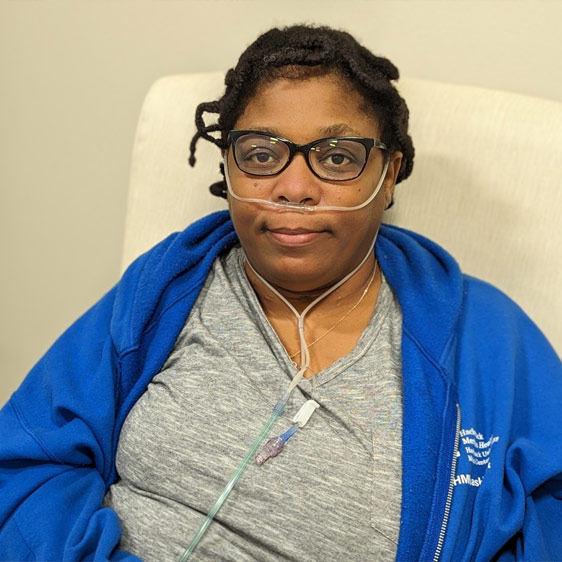 “The reason I advocated for transportation help was that the patients would call EMS and go to the emergency room to get care instead of coming to the clinic because they did not have transportation,” Gault says. “Or they would wait and be in pain or have low hemoglobin levels, so they had to be admitted to the hospital.”
“The reason I advocated for transportation help was that the patients would call EMS and go to the emergency room to get care instead of coming to the clinic because they did not have transportation,” Gault says. “Or they would wait and be in pain or have low hemoglobin levels, so they had to be admitted to the hospital.”
The need for a transportation service was also highlighted in the 2022 Community Health Needs Assessment conducted by Beaufort Memorial. The assessment identified access and availability to health care services as a high-priority need for the Beaufort, Jasper and Hampton county communities.
Read More: ‘A Living Testimony’: Rhonda Rivers
Making an Immediate Impact
Prior to the implementation of the Beaufort Memorial transportation program, patients without a vehicle of their own or someone who could drive them relied on a taxi service. This plan was less than ideal — not only was it expensive, but traveling via taxi was also time-consuming.
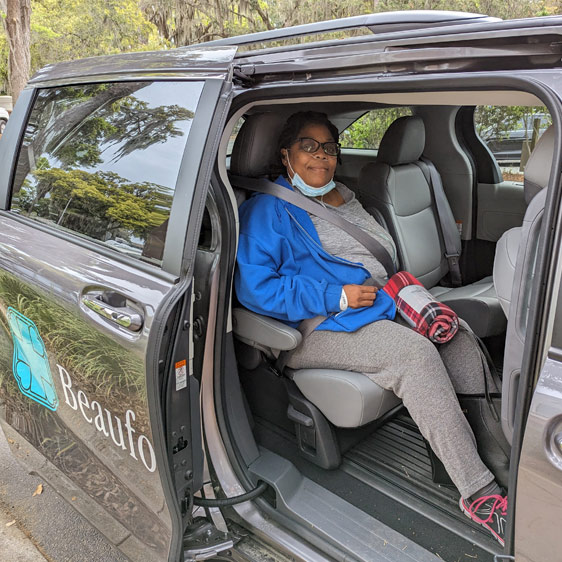 Today, two Beaufort Memorial vehicles provide transportation for patients in need, including those who have cancer or sickle cell disease, pre-operative patients and those discharged from the hospital. The first vehicle was purchased in 2021 using a grant from the Coastal Blood Foundation and the Beaufort Memorial Hospital Foundation purchased the second in 2022. The cars are stocked with crackers and water for oncology patients.
Today, two Beaufort Memorial vehicles provide transportation for patients in need, including those who have cancer or sickle cell disease, pre-operative patients and those discharged from the hospital. The first vehicle was purchased in 2021 using a grant from the Coastal Blood Foundation and the Beaufort Memorial Hospital Foundation purchased the second in 2022. The cars are stocked with crackers and water for oncology patients.
Many patients have benefited in only two years. As of April, the service has helped 1,714 patients get to and from their appointments at Beaufort Memorial facilities, totaling 19,845 miles driven.
“I look forward to getting up and getting ready. They pick me up on time. It’s great,” says Dovetta Wilson, a Sickle Cell Clinic patient. Wilson, whose commute is 16 miles roundtrip, uses the Beaufort Memorial transportation service about twice a month to manage her condition. Previously, she relied on transportation from her daughter, who would have to take time off work, or a taxi service.
“This is much different than what was available before,” Wilson says. “It’s really good to have somebody look out for you and pick you up. I don’t have to rely on myself to get there. I know I’m going to get there with the transportation. It’s a good service — I can’t ask for anything more.”
Read More: Overcoming Sickle Cell Disease: Danielle Jamison’s Story
More Than Just a Ride
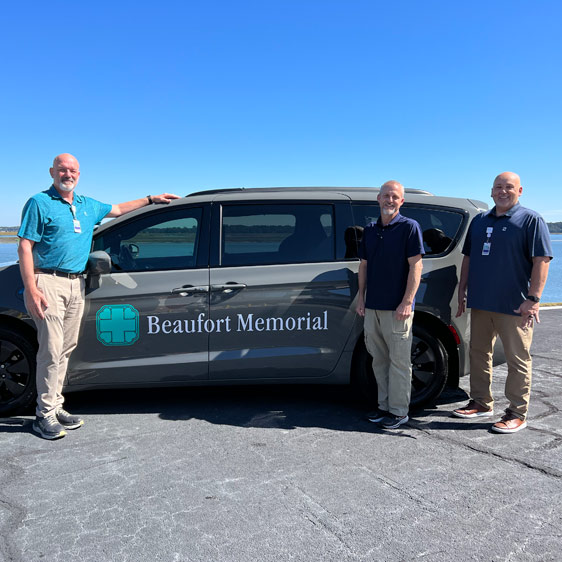 The Beaufort Memorial transportation program relies on four drivers to perform a variety of transportation services. For these drivers, the experience is more than just providing a ride. Transportation Specialist Dean Adams earned Beaufort Memorial’s nonclinical employee of the year for going above and beyond to help a cancer patient who used the transportation services to attend her appointments at the Okatie Medical Pavilion. Over the course of time interacting with the patient, Dean realized that the patient had no local friends or family. She was going through all her cancer treatments alone.
The Beaufort Memorial transportation program relies on four drivers to perform a variety of transportation services. For these drivers, the experience is more than just providing a ride. Transportation Specialist Dean Adams earned Beaufort Memorial’s nonclinical employee of the year for going above and beyond to help a cancer patient who used the transportation services to attend her appointments at the Okatie Medical Pavilion. Over the course of time interacting with the patient, Dean realized that the patient had no local friends or family. She was going through all her cancer treatments alone.
When the patient achieved a major milestone in her treatment, Dean reached into his own pocket and purchased a cake and card for the patient. He ensured that staff signed the card to make it extra special.
“His extra touches had the patient smiling from ear to ear and made this memorable day even more special for her,” read the nomination. “His response to us praising him for his actions was ‘It was no big deal.’ He has a huge heart and considers things like this to be ‘just part of the job’ even though they make such a huge impact on the patients. He always takes pride in what he does. He is truly an asset!”
In addition to ferrying patients to and from Beaufort Memorial facilities, drivers also deliver office and medical supplies, chemotherapy medications and blood products.
Jim LaMountain, transportation specialist supervisor, enjoys having a hands-on role in filling a need for patients and helping them access care.
“I would have never guessed how impactful we would be just by giving somebody a ride,” LaMountain says. “We’re part of their care team. We’re helping to extend their quality of life, helping their kids still be with their mom and dad, and so on and so forth. It’s really been just absolutely amazing.”
That’s the impact Gault was hoping for when she advocated for Beaufort Memorial to begin providing transportation assistance.
“By using Beaufort Memorial transportation, patients are better taken care of, they are coming to their appointments on time, they don’t turn to the ER as often, and the majority of them haven’t been admitted to the hospital since we began using the transportation service,” Gault says. “My patients and I are very happy and pleased with the transportation team. They all do an excellent job.”
If you have trouble with reliable transportation to your sickle cell and infusion appointments at Beaufort Memorial, talk with your provider about accessing our transportation services. Our staff will follow up with patients to verify individual needs.
Learn about other services we provide to the community. From this page, you can also download our guide with other community health resources, including help with housing, utilities, interpersonal safety and food.

